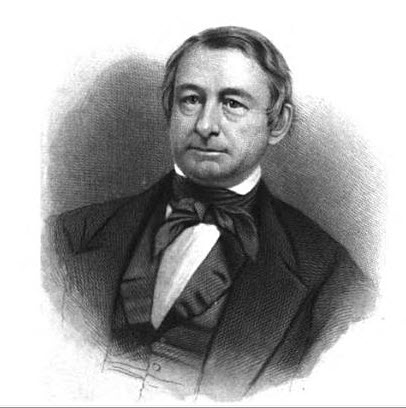“What has caused this great commotion, motion, motion,
Our country through?
It is the ball a-rolling on,
For Tippecanoe and Tyler too.
Tippecanoe and Tyler too.
And with them we'll beat the little Van, van, van;
Van is a used-up man,
And with them we'll beat little Van!”
The attendant carriage, quadrupeds, bipeds and the rustic
procession, rumbled through the streets and entered Salem, threading its way
and finally reaching the crowded common.[9]
An aristocratic Whig of the old school as well as an outstanding
statesman, orator and lawyer, Daniel Webster held the crowd with his great
skill. Commenting on the “humble birth of their candidate for the Presidency”
he said, “It did not happen to me, gentlemen, to be born in a log-cabin; but my
elder brothers and sisters were born in a log-cabin, raised amid the snow-drifts
of New Hampshire, at a period so early that, when the smoke first rose from its
rude chimney and curled over the frozen hills, there was no similar evidence of
a white man's habitation between it and the settlements of the rivers of
Canada. It remains still exist. I make to it an annual visit; I carry my
children to it, to teach them the hardships endured by the generations which
have gone before them. I love to dwell on the tender recollections, the kindred
ties, the early affections, and the touching narratives and incidents which
mingle with all I know of their primitive family abode. I weep to think that
none of those who inhabited it are now among the living; and if ever I am
ashamed of it, or if ever I fail in affectionate veneration of him who reared it
and defended it against savage violence and destruction, cherished all the
domestic virtues beneath its roof, and, through the fire and blood of a seven
years' Revolutionary war, shrunk from no danger, no toil, no sacrifice, to serve
his country and to raise his children to a condition better than his own, - may
my name and the name of my posterity be blotted for ever from the memory of
mankind!”[10]
Although Webster was not a leader the citizens voted for, he was
highly esteemed and respected and the people of Massachusetts were honored when
he was asked by Harrison to serve in the Whig cabinet as Secretary of State.
Rufus Choate was chosen to complete Webster's term in the U.S. Senate. In
November, Salem and Danvers celebrated. Buildings were illuminated as
victorious Whigs took to the streets. Some disappointed Democrats assembled
outside of their headquarters on Central Street and as the procession of
celebrants passed by, they hooted and jeered.[11}
As President of the Senate, Daniel received an invitation from the
Whigs of Boston to the Grand Ball held at Faneuil Hall “to celebrate the
accession of General Harrison to the Presidency of the United States.”[12]
It seemed the celebrating had barely stopped when the Whigs suffered
an unbearable disappointment. After a month in the White House, Harrison, the
oldest President ever inaugurated, died. John Tyler of Virginia became the
“accidental” President.
